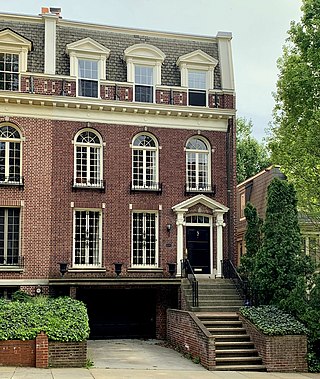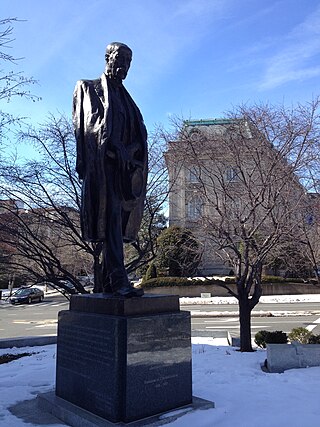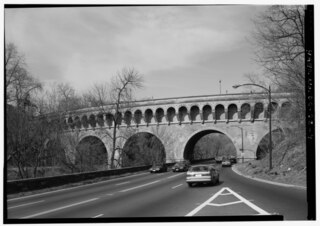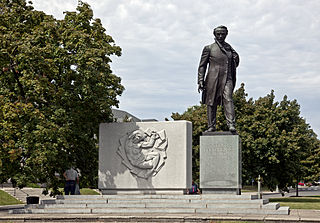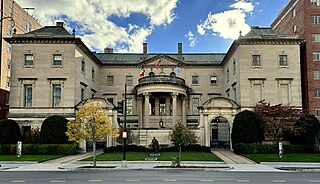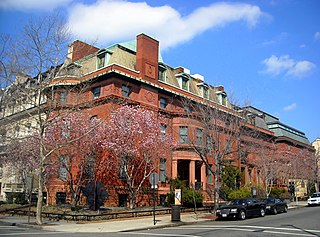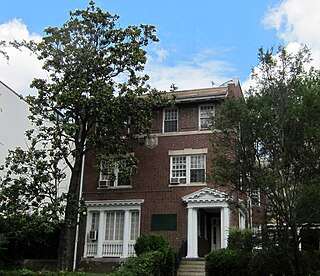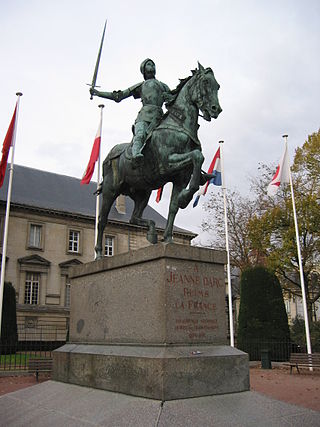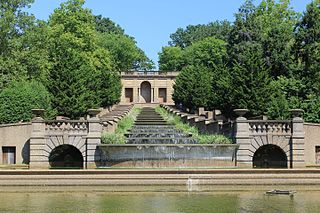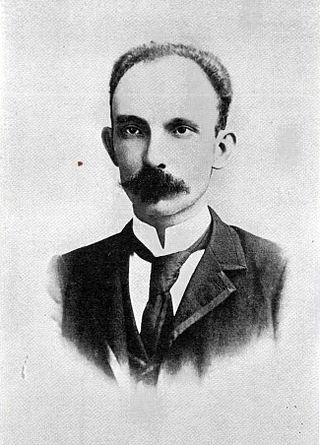Self-guided Sightseeing Tour #12 in Washington, United States
Legend
Tour Facts
5.4 km
107 m
Experience Washington in United States in a whole new way with our free self-guided sightseeing tour. This site not only offers you practical information and insider tips, but also a rich variety of activities and sights you shouldn't miss. Whether you love art and culture, want to explore historical sites or simply want to experience the vibrant atmosphere of a lively city - you'll find everything you need for your personal adventure here.
Individual Sights in WashingtonSight 1: Frances Perkins House
The Frances Perkins House is a historic house at 2326 California Street NW in Washington, D.C. Built in 1914, it was from 1937 to 1940 the home of Frances Perkins (1880-1965), the first woman to serve in the United States Cabinet. Perkins was the Secretary of Labor under president Franklin Delano Roosevelt, and was a major force in advancing his New Deal agenda. This house was declared a National Historic Landmark in 1991.
Sight 2: Sheridan Circle
Sheridan Circle is a traffic circle and park in the Sheridan-Kalorama neighborhood of Washington, D.C. The traffic circle, one of two in the neighborhood, is the intersection of 23rd Street NW, Massachusetts Avenue NW, and R Street NW. The buildings along this stretch of Massachusetts Avenue NW are part of Embassy Row, which runs from Scott Circle to Observatory Circle. Sheridan Circle is a contributing property to the Massachusetts Avenue Historic District and the Sheridan-Kalorama Historic District, both listed on the National Register of Historic Places (NRHP). In addition, the equestrian statue of General Philip Sheridan is 1 of 18 Civil War Monuments in Washington, D.C., that were collectively listed on the NRHP.
Sight 3: Tomáš Garrigue Masaryk Statue
The statue of Tomáš Garrigue Masaryk consists of a statue of Tomáš Masaryk, the founding President of Czechoslovakia, sited in a small hardscaped park. The memorial was established by the non-profit American Friends of the Czech Republic, which obtained an Act of Congress to authorize the site, raised the funding, and oversaw the design and construction. The statue was in part a gift from the Czech Republic. The memorial was dedicated on Embassy Row on September 19, 2002, with the participation of Czech President Václav Havel, former Slovak President Michal Kováč, and Prague-born former U.S. Secretary of State Madeleine Albright.
Sight 4: Q Street Northwest
The Dumbarton Bridge, also known as the Q Street Bridge and the Buffalo Bridge, is a historic masonry arch bridge in Washington, D.C.
Sight 5: Taras Shevchenko Statue
The Taras Shevchenko Memorial is a bronze statue and stone relief-adorned wall located on the 2200 block of P Street NW in the Dupont Circle neighborhood of Washington, D.C., United States. It is one of many monuments in Washington, D.C. that honor foreign heroes who symbolize freedom in their native countries. Sculpted by Leo Mol, the memorial honors Taras Shevchenko (1814–1861), a Ukrainian poet and artist who influenced the development of modern Ukrainian literature.
Sight 6: Anderson House
Anderson House, also known as Larz Anderson House, is a Gilded Age mansion located at 2118 Massachusetts Avenue, NW, on Embassy Row in the Dupont Circle neighborhood of Washington, D.C. It now houses the Society of the Cincinnati's international headquarters and a research library on 17th- and 18th-century military and naval history and the art of war. It is also open to the public as a historic house museum about life in Washington in the early 20th century.
Sight 7: Mohandas K. Gandhi Statue
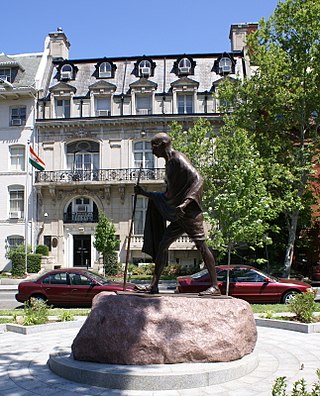
The Mahatma Gandhi Memorial is a public statue of Mahatma Gandhi, installed on a triangular island along Massachusetts Avenue, in front of the Embassy of India, Washington, D.C., in the United States. A gift from the Indian Council for Cultural Relations, it was dedicated on September 16, 2000 during a state visit of Indian Prime Minister Atal Bihari Vajpayee in the presence of US President Bill Clinton.
Sight 8: The Phillips Collection
The Phillips Collection is an art museum founded by Duncan Phillips and Marjorie Acker Phillips in 1921 as the Phillips Memorial Gallery located in the Dupont Circle neighborhood of Washington, D.C. Phillips was the grandson of James H. Laughlin, a banker and co-founder of the Jones and Laughlin Steel Company.
Sight 9: American Fazl Mosque
The Fazl Mosque in Washington, D.C. was established by the Ahmadiyya Muslim Community in 1950 and is the first mosque in the U.S. capital of Washington, D.C. Its full title is the American Fazl Mosque, which helps to distinguish it from its sister mosque, the Fazl Mosque, London, both of which were the first mosques in the capitals of the U.S. and the U.K., respectively. Located a few minutes from the White House, and neighboring several embassies, Fazl Mosque opened seven years prior to the Islamic Center of Washington and is the longest serving mosque in the nation's capital.
Sight 10: Laogai Museum
The Laogai Museum is a museum in Dupont Circle, Washington, D.C., United States, which showcases human rights in the People's Republic of China, focusing particularly on Láogǎi, the Chinese prison system of "Reform through Labor". The creation of the museum was spearheaded by Harry Wu, a well-known Chinese dissident who himself served 19 years in laogai prisons; it was supported by the Yahoo! Human Rights Fund. It opened to the public on 12 November 2008, and Wu's non-profit research organization calls it the first museum in the United States to directly address the issue of human rights in China. It is now permanently closed.
Sight 11: Joan of Arc Memorial
Joan of Arc is a monumental bronze sculpture by French sculptor Paul Dubois. It depicts Joan of Arc both as a warrior and as a divinely inspired visionary.
Sight 12: Meridian Hill/Malcolm X Park
Meridian Hill Park is an urban park in Washington, D.C., located in the Meridian Hill neighborhood that straddles the border between Adams Morgan and Columbia Heights, in Northwest D.C. The park was built between 1912-40 and covers 12-acre (49,000 m2). Meridian Hill Park is bordered by 15th, 16th, W, and Euclid streets NW, and sits on a prominent hill 1.5 miles (2.4 km) directly north of the White House. Since 1969, the name Malcolm X Park is used by some in honor of Malcolm X.
Sight 13: Serenity Statue
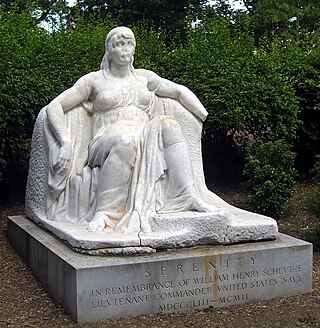
Serenity is a public artwork by Catalan artist Josep Clarà i Ayats, located at Meridian Hill Park in Washington, D.C., United States. Serenity was originally surveyed as part of the Smithsonian's Save Outdoor Sculpture! survey in 1993.
Sight 14: José Martí Héroe Nacional de Cuba
José Julián Martí Pérez was a Cuban nationalist, poet, philosopher, essayist, journalist, translator, professor, and publisher, who is considered a Cuban national hero because of his role in the liberation of his country from Spain. He was also an important figure in Latin American literature. He was very politically active and is considered an important philosopher and political theorist. Through his writings and political activity, he became a symbol of Cuba's bid for independence from the Spanish Empire in the 19th century, and is referred to as the "Apostle of Cuban Independence". From adolescence on, he dedicated his life to the promotion of liberty, political independence for Cuba, and intellectual independence for all Spanish Americans; his death was used as a cry for Cuban independence from Spain by both the Cuban revolutionaries and those Cubans previously reluctant to start a revolt.
Share
How likely are you to recommend us?
Disclaimer Please be aware of your surroundings and do not enter private property. We are not liable for any damages that occur during the tours.
GPX-Download For navigation apps and GPS devices you can download the tour as a GPX file.
